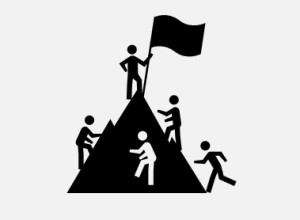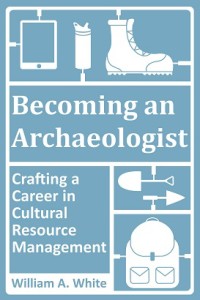 Anyone familiar with the cultural resource management industry knows that it’s not easy to land a job as an archaeologist. As is the same with any industry, aspirants need fortitude, persistence, and be confident in their own skills. They also need to network—connecting with the right people that will help further their career. Friendraising for a job in archaeology is an exercise in helping others while you help yourself. In the case of an aspiring archaeologist you are not only trying to help others and yourself, you are also attempting to do right for the communities in which you work. This is an ethical tightrope that folks in other fields tend to overlook.
Anyone familiar with the cultural resource management industry knows that it’s not easy to land a job as an archaeologist. As is the same with any industry, aspirants need fortitude, persistence, and be confident in their own skills. They also need to network—connecting with the right people that will help further their career. Friendraising for a job in archaeology is an exercise in helping others while you help yourself. In the case of an aspiring archaeologist you are not only trying to help others and yourself, you are also attempting to do right for the communities in which you work. This is an ethical tightrope that folks in other fields tend to overlook.
Since the creation of federally mandated cultural resource management, thousands of archaeologist have found jobs recording the tangible remains of local heritage and preserving (or at least recording) this data for future generations. For most CRMers, landing the job just another part of a longer journey called a professional career.
For CRMers, archaeology is a dream as much as it is a job. The difficult part is transforming that dream job into a career. Becoming an archaeologist is realizing the dream. Turning that passion into a long-term career requires maintaining the enthusiasm for archaeology while investing your concentration and effort into building your professional reputation by accomplishing more and more CRM projects. This is where a lot of us have trouble.
You have the power to become your own career counselor
My high school career counselor said I should have been an architect, engineer, or bus driver. She was going simply on the result of a battery of aptitude tests I took as a high school senior. Those tests cannot measure passion or interest, so they simply match physical and mental faculties to careers. My family thought I should go to business school, medicine, or become some sort of scientist. By science, they meant physics, astronomy, chemistry, or any of a number of “hard sciences.” Few believed archaeology was a viable career. None of us knew cultural resource management even existed.
I started college as a marketing major. I was going to make commercials. But, I didn’t care a bit about doing that for a living. Now that I look back, I was simply doing what I thought would make a lot of money—a mistake millions of Americans are making right at this moment. Fortunately, I changed my major into archaeology because living that lifestyle of gallivanting around the world looking for ancient sites was much more interesting than sitting in a cubicle trying to figure out how to get people to buy stuff they don’t even need. This was a change that set me on the unconventional path I have been following for almost 20 years.
There were few people that could help me on this quest. Among those who could help, few took enough interest to give me guidance and perspective. Most of my friend and family didn’t even believe I could do it. In the late 1990s when I started on my current trajectory, there were no blogs or podcasts on cultural resource management. There were few articles or books. None of these resources helped early careerists like myself figure out how to find work, land jobs, and maintain career goals. I was among the thousands of CRMers who had to figure it our on our own.
Through trial by fire and multiple errors, I figured out a way to land work in CRM and keep my career moving forward. I used side projects, conferences, and blogging/podcasting to maintain my enthusiasm for the field and cut through the mind-numbing aspects of being an archaeological consultant. These activities helped keep my spirit alive and, sometimes, they brought a little money into my pocket.
My career is not perfect. Nor, is there any way it can ever be because my life is constantly changing and what I want out of work also changes all the time. Fulfillment is a moving target that you can hit but never in the Bull’s Eye. That is part of what it means to be a working adult.
In order to figure out how to get paid to do archaeology, you will have to become your own career councilor. You will have to learn how to consistently find work through your network while also maintaining personal research interests. It’s awesome when both of those elements come together. Most of the time you will get paid to do your job or to follow your interests but not both. You will also have to figure out how to balance your personal life—partner/spouse, kids, house, bills, education, and all the other things “normal” folk attend to—while fitting archaeology in there somewhere. It seems hard, but millions of people around the world manage this every day.
Visualizing your life is central to maintaining sanity and keeping your career moving forward. Your vision of life you want to live is the only way you will be able to gauge success as measured by your own standards. Most people go after the job without giving a moment’s thought as to how this job is effecting their lifestyle. Since archaeology is born of dreams, it only makes sense that you would keep dreaming until you make the other parts of your life a reality. Again, this is a moving target that is meant to be a motivation rather than a concrete destination.
You can become the best career counselor in the world for yourself because only you know what you want to be. You are the only only one that knows what you what out of life and how working as an archaeologist contributes to that goal. Unless you’ve told anyone else, you are the only one that knows your own passions, needs, and interests. Rather than waiting for somebody else to tell you what to do, you should take action. Create a clear vision of your career, lifestyle, and destination. This sounds crazy but it will only happen if you make it happen.
Download “Becoming an Archaeologist: Crafting a Career i n Cultural Resource Management”
n Cultural Resource Management”
The cultural resource management industry employs the vast majority of archaeologists in the United States, Europe, Australia, and the rest of the world. Archaeologists are not the only CRMers, but they are the majority of them.
My newest eBook is a guide for anyone that wants to do archaeology for a living. It is the step-by-step guide I always wish existed. The book “Becoming an Archaeologist” is a distillation of several anthropology/archaeology career books, job seeker guides, blog posts, and conversations with hiring managers and human resources representatives. It is also full of advice I’ve received from CRMers across the country throughout my career.
The book is available on the Amazon Kindle store right now, but you can download it for free this weekend only (May 27th through May 28th, 2016). Grab your free copy and tell me what you think. Write a comment below or send me an email.
Check out Succinct Research’s contribution to Blogging Archaeology. Full of amazing information about how blogging is revolutionizing archaeology publishing. For a limited time you can GRAB A COPY FOR FREE!!!! Click Here
 “Resume-Writing for Archaeologists” is now available on Amazon.com. Click Here and get detailed instructions on how you can land a job in CRM archaeology today!
“Resume-Writing for Archaeologists” is now available on Amazon.com. Click Here and get detailed instructions on how you can land a job in CRM archaeology today!
 Small Archaeology Project Management is now on the Kindle Store. Over 300 copies were sold in the first month! Click Here and see what the buzz is all about.
Small Archaeology Project Management is now on the Kindle Store. Over 300 copies were sold in the first month! Click Here and see what the buzz is all about.
Join the Succinct Research email list and receive additional information on the CRM and heritage conservation field.
Get killer information about the CRM archaeology industry and historic preservation.



